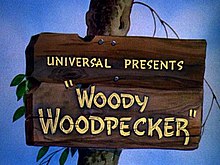This article consists almost entirely of a plot summary .(November 2021) |
| Woody Woodpecker | |
|---|---|
 Title card | |
| Directed by | Walter Lantz (unc.) |
| Story by | Ben Hardaway Jack Cosgriff |
| Produced by | Walter Lantz |
| Starring | Mel Blanc Margaret Hill-Talbot Danny Webb Ben Hardaway (all unc.) [1] |
| Music by | Darrell Calker |
| Animation by | Alex Lovy Ray Fahringer Les Kline (unc.) Laverne Harding (unc.) |
| Backgrounds by | Ed Kiechle (unc.) |
| Color process | Technicolor |
Production company | |
| Distributed by | Universal Pictures |
Release date |
|
Running time | 6:55 |
| Country | United States |
| Language | English |
Woody Woodpecker is the first animated cartoon short subject in the Woody Woodpecker series. Released theatrically on July 7, 1941, [2] the film was produced by Walter Lantz Productions and distributed by Universal Pictures. [3]
Contents
This is the second appearance of Woody Woodpecker; his debut was in an Andy Panda cartoon, Knock Knock .
The working title of this cartoon is 'Cracked Nut'.